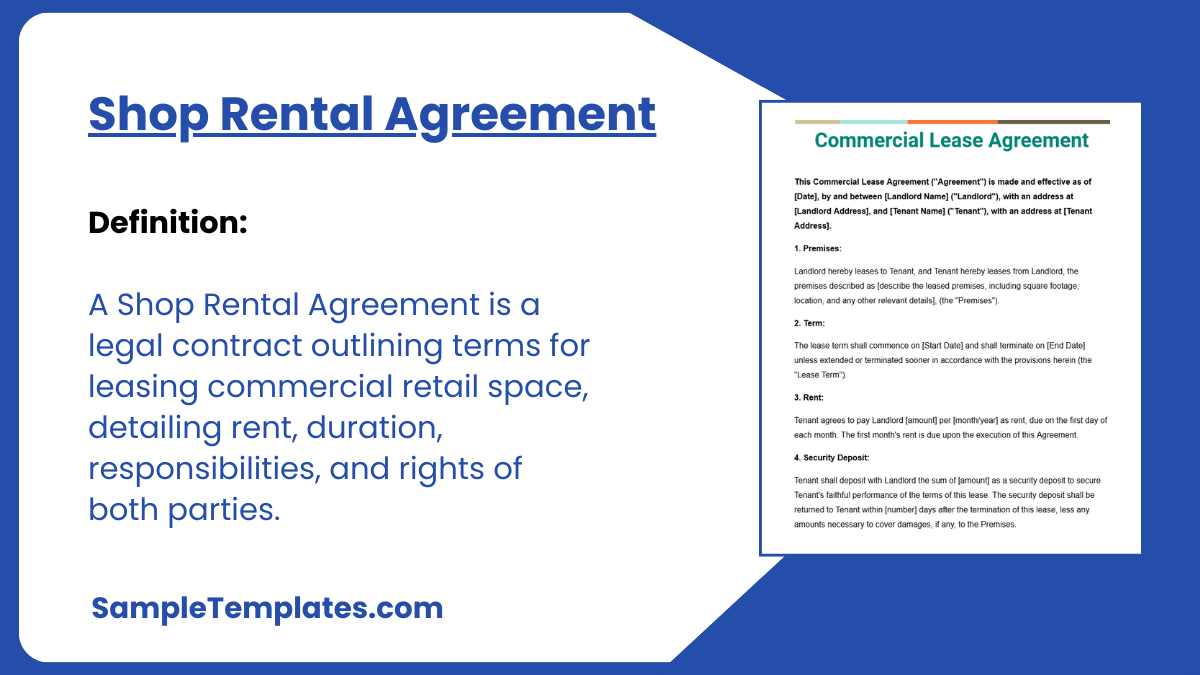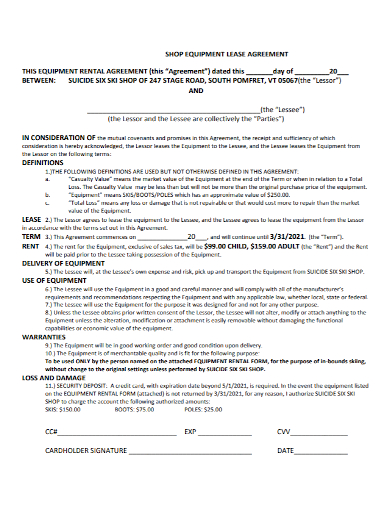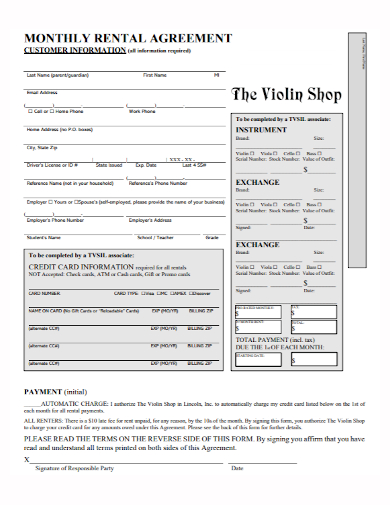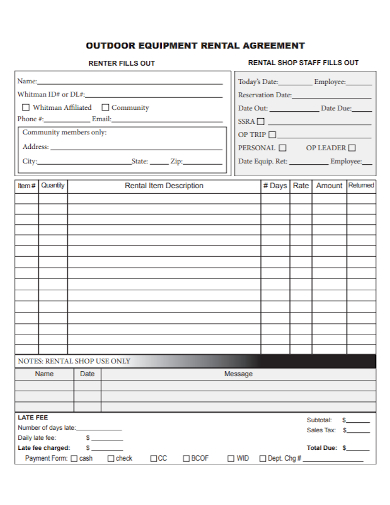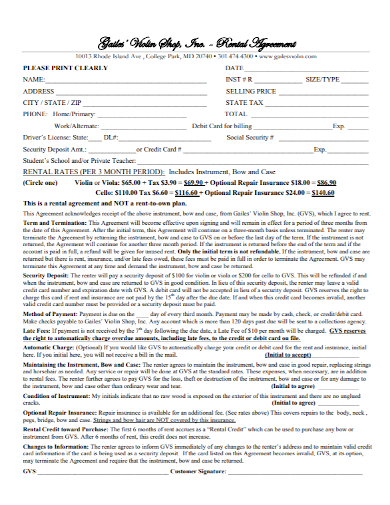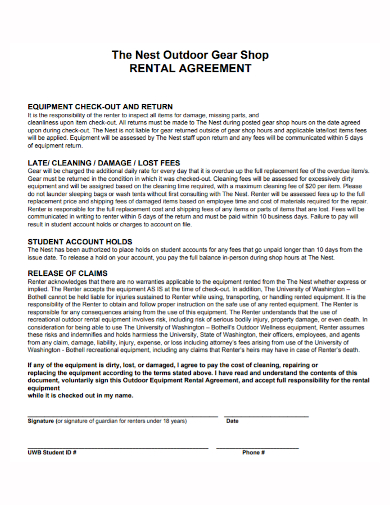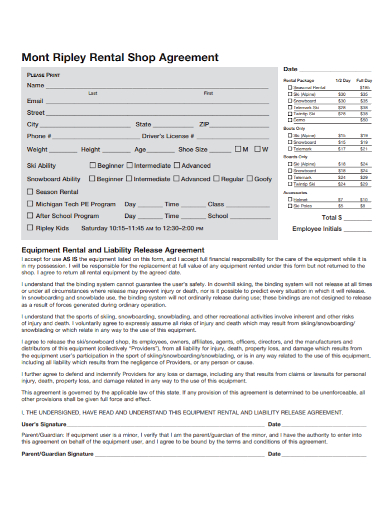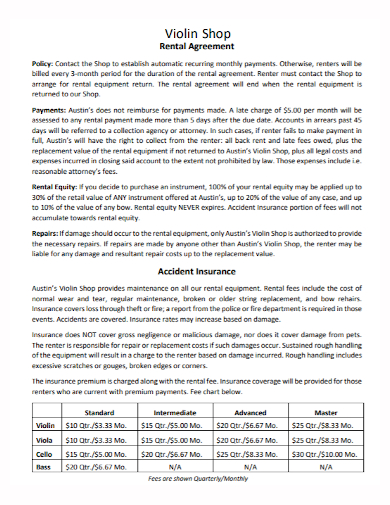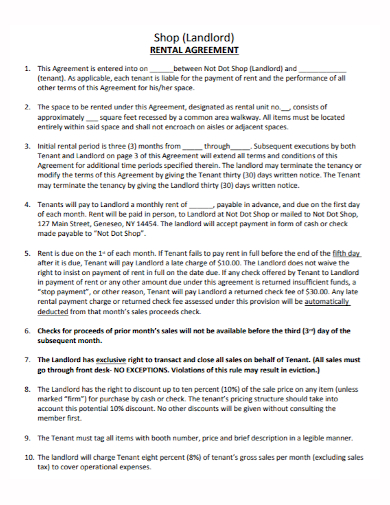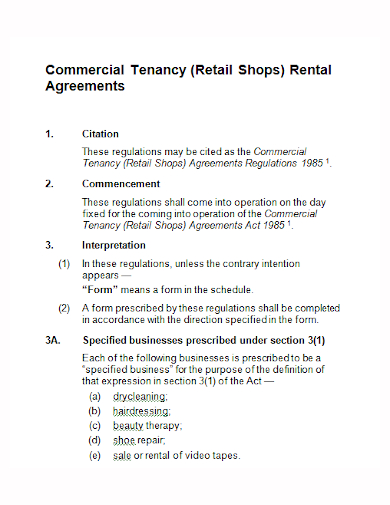Let’s say you have a property somewhere in the middle of the city’s business district. Now this isn’t just like any other property in the area. It’s placed perfectly where it’s easily exposed to traffic. Meaning people come by this area more often than not, passing by, going through their day, but still nearly interacting with your property. I say nearly because, well there’s nothing there yet. The smartest thing to do here would be to take advantage of this good spot and establish a business agenda there. With the significant amount of people passing by, surely some, if not most of them will be interested to interact with your shop and buy something.
That’s simply how business works, startup ones at least. Now, say you can’t establish the business on your own, you have have some prior arrangements that need to be attended to or maybe another business in another place that you need to oversee. Well the second best thing to do with your property if to have someone else rent it. They can establish their own shop and still you’re raking in cash from the rental payments. Now, to make sure that you and your client or the person who’s renting the property is on the same page, you’ll need to draft a document most commonly known as a shop rental agreement.
As a landlord or a property owner, if you want your property to be rented, it is important to have a document such a a shop rental agreement to protect your rights as a property owner and your property itself. If ever you and your tenant come across a legal dispute, you will have a more favorable outcome in court if you have a written agreement on hand. The document ensures that whatever your tenant may be doing in your property, it is well within what the both parties agreed to. It just saves you a lot of money and a lot of trouble away from disaster. There have been some pretty interesting cases of landlords being cheated away from their own properties because they lack the sufficient documentations in order to defend themselves in a legal process.
That is why before any business is done, it is imperative to have a shop rental agreement that the both parties have agreed to and will uphold. To properly draft this document, you have to make sure that you are perfectly familiar with is, what it looks like and how it work. Check out these shop rental agreement samples that we have listed down below. Once you’ve gotten yourself acquainted with the document, feel free to use these samples as a guide or even as templates for your own shop rental agreement.
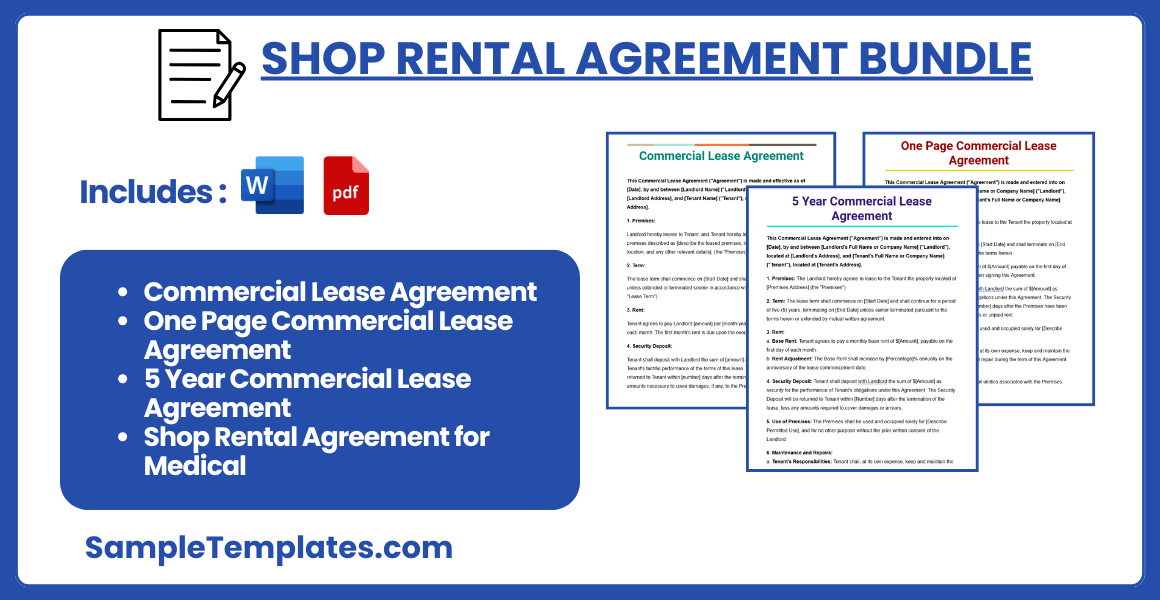
Download Shop Rental Agreement Bundle
Commercial Lease Agreement
This Commercial Lease Agreement (“Agreement”) is made and effective as of [Date], by and between [Landlord Name] (“Landlord”), with an address at [Landlord Address], and [Tenant Name] (“Tenant”), with an address at [Tenant Address].
1. Premises:
Landlord hereby leases to Tenant, and Tenant hereby leases from Landlord, the premises described as [describe the leased premises, including square footage, location, and any other relevant details], (the “Premises”).
2. Term:
The lease term shall commence on [Start Date] and shall terminate on [End Date] unless extended or terminated sooner in accordance with the provisions herein (the “Lease Term”).
3. Rent:
Tenant agrees to pay Landlord [amount] per [month/year] as rent, due on the first day of each month. The first month’s rent is due upon the execution of this Agreement.
4. Security Deposit:
Tenant shall deposit with Landlord the sum of [amount] as a security deposit to secure Tenant’s faithful performance of the terms of this lease. The security deposit shall be returned to Tenant within [number] days after the termination of this lease, less any amounts necessary to cover damages, if any, to the Premises.
5. Use of Premises:
The Premises shall be used and occupied solely for [specify type of business or commercial activity], and for no other purpose without the prior written consent of Landlord.
6. Maintenance and Repairs:
Tenant shall, at Tenant’s own expense, keep and maintain the Premises in good and sanitary condition and repair during the term of this lease and any extension thereof.
7. Alterations:
No alterations, additions, or improvements shall be made by Tenant to the Premises without the prior written consent of Landlord.
8. Insurance:
Tenant shall maintain at Tenant’s expense, throughout the term of the lease, insurance coverage sufficient to cover loss or damage to the Premises and liability insurance covering Tenant’s activities on the Premises.
9. Utilities:
Tenant shall be responsible for all utilities and services incurred in relation to the Premises unless otherwise specified in this Agreement.
10. Termination:
Upon termination of this lease, Tenant shall surrender the Premises in as good a state and condition as they were at the commencement of this lease, reasonable use and wear and tear excepted.
11. Default:
If Tenant fails to comply with any of the financial or material provisions of this Agreement, and such failure continues for more than [number] days after written notice from Landlord, this shall constitute a default under this Agreement.
12. Governing Law:
This Agreement shall be governed by, and construed in accordance with, the laws of the State of [State Name].
13. Signatures:
IN WITNESS WHEREOF, the parties hereto have executed this Commercial Lease Agreement on the day and year first above written.
[Landlord’s Signature & Date]
[Printed Name of Landlord]
[Tenant’s Signature & Date]
[Printed Name of Tenant]
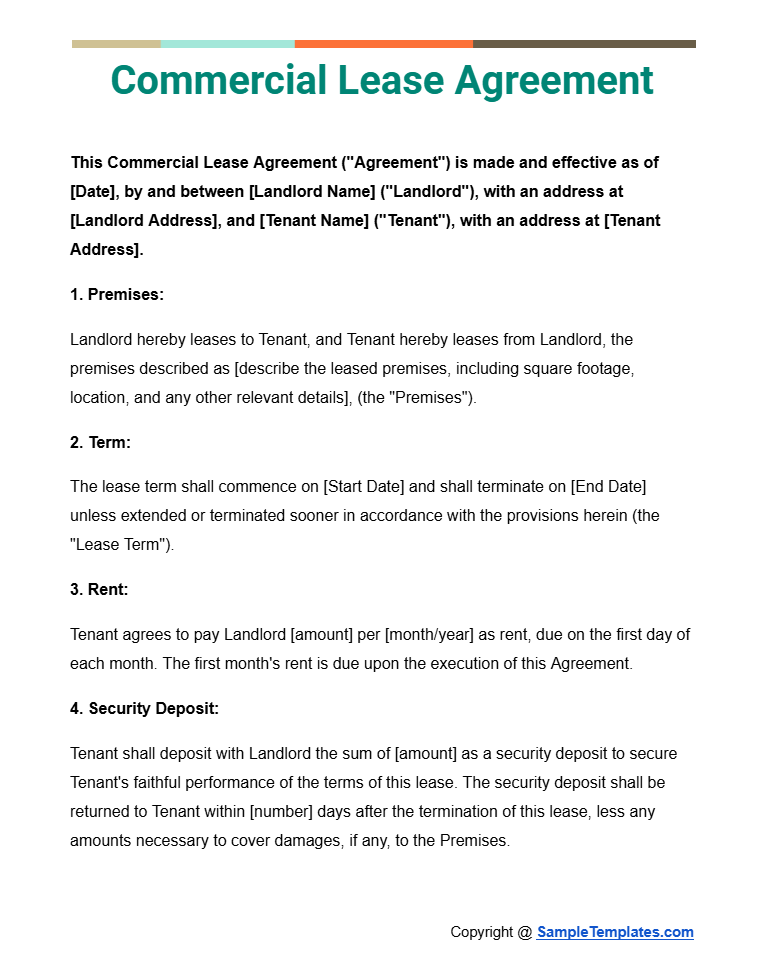
One Page Commercial Lease Agreement
This Commercial Lease Agreement (“Agreement”) is made and entered into on [Date], by and between [Landlord’s Full Name or Company Name] (“Landlord”), located at [Landlord’s Address], and [Tenant’s Full Name or Company Name] (“Tenant”), located at [Tenant’s Address].
1. Premises: The Landlord hereby agrees to lease to the Tenant the property located at [Premises Address] (the “Premises”).
2. Term: The lease term shall commence on [Start Date] and shall terminate on [End Date] unless earlier terminated pursuant to the terms herein.
3. Rent: Tenant agrees to pay a monthly rent of $[Amount] payable on the first day of each month. The first month’s rent is due upon signing this Agreement.
4. Security Deposit: Tenant shall deposit with Landlord the sum of $[Amount] as security for the performance of Tenant’s obligations under this Agreement. The Security Deposit will be returned to Tenant within [Number] days after the Premises have been vacated less any amount applied to damages or unpaid rent.
5. Use of Premises: The Premises shall be used and occupied solely for [Describe Permitted Use] and for no other purpose.
6. Maintenance and Repairs: Tenant shall, at its own expense, keep and maintain the Premises in good and sanitary condition and repair during the term of this Agreement and any renewal thereof.
7. Utilities: Tenant shall be responsible for all utilities associated with the Premises.
8. Insurance: Tenant shall maintain commercial general liability insurance coverage in an amount not less than $[Amount] per occurrence.
9. Indemnification: Tenant will indemnify and hold Landlord harmless from and against any liabilities, fines, penalties, or costs resulting from the Tenant’s use of the Premises.
10. Termination: Either party may terminate this Agreement upon [Number] days written notice to the other party.
11. Governing Law: This Agreement shall be governed by and construed in accordance with the laws of the State of [State].
Signatures:
[Landlord’s Name/Signature]
Landlord
[Tenant’s Name/Signature]
Tenant
Date: [Date of Signing]
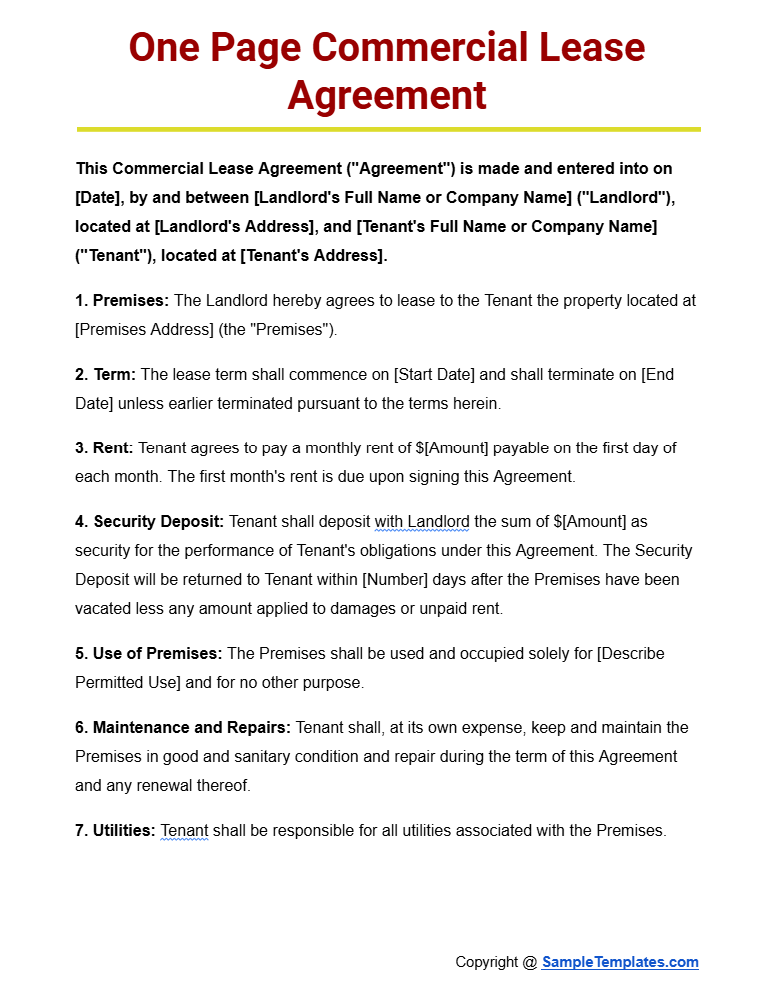
5 Year Commercial Lease Agreement
This Commercial Lease Agreement (“Agreement”) is made and entered into on [Date], by and between [Landlord’s Full Name or Company Name] (“Landlord”), located at [Landlord’s Address], and [Tenant’s Full Name or Company Name] (“Tenant”), located at [Tenant’s Address].
1. Premises: The Landlord hereby agrees to lease to the Tenant the property located at [Premises Address] (the “Premises”).
2. Term: The lease term shall commence on [Start Date] and shall continue for a period of five (5) years, terminating on [End Date] unless earlier terminated pursuant to the terms herein or extended by mutual written agreement.
3. Rent:
a. Base Rent: Tenant agrees to pay a monthly base rent of $[Amount], payable on the first day of each month.
b. Rent Adjustment: The Base Rent shall increase by [Percentage]% annually on the anniversary of the lease commencement date.
4. Security Deposit: Tenant shall deposit with Landlord the sum of $[Amount] as security for the performance of Tenant’s obligations under this Agreement. The Security Deposit will be returned to Tenant within [Number] days after the termination of the lease, less any amounts required to cover damages or arrears.
5. Use of Premises: The Premises shall be used and occupied solely for [Describe Permitted Use], and for no other purpose without the prior written consent of the Landlord.
6. Maintenance and Repairs:
a. Tenant’s Responsibilities: Tenant shall, at its own expense, keep and maintain the Premises in good and sanitary condition and repair during the term of this Agreement and any renewal thereof.
b. Landlord’s Responsibilities: Landlord shall be responsible for structural repairs and maintenance of common areas.
7. Utilities and Services: Tenant shall be responsible for all utilities and services incurred in relation to the Premises, except for [Exceptions if any].
8. Alterations and Improvements: Tenant may not make any alterations to the Premises without the prior written consent of the Landlord. All alterations shall become the property of the Landlord upon termination of this lease.
9. Insurance: Tenant shall maintain commercial general liability insurance coverage in an amount not less than $[Amount] per occurrence and property insurance on its own contents.
10. Indemnification: Tenant agrees to indemnify, defend, and hold the Landlord harmless from any claims arising from Tenant’s use of the Premises, except for those due to Landlord’s negligence.
11. Termination and Renewal:
a. Early Termination: Either party may terminate this Agreement upon [Number] days written notice to the other party under specific conditions stated herein.
b. Renewal: This Agreement may be renewed upon mutual agreement of both parties in writing at least [Number] months before the current term expires.
12. Governing Law: This Agreement shall be governed by and construed in accordance with the laws of the State of [State].
Signatures:
[Landlord’s Name/Signature]
Landlord
[Tenant’s Name/Signature]
Tenant
Date: [Date of Signing]
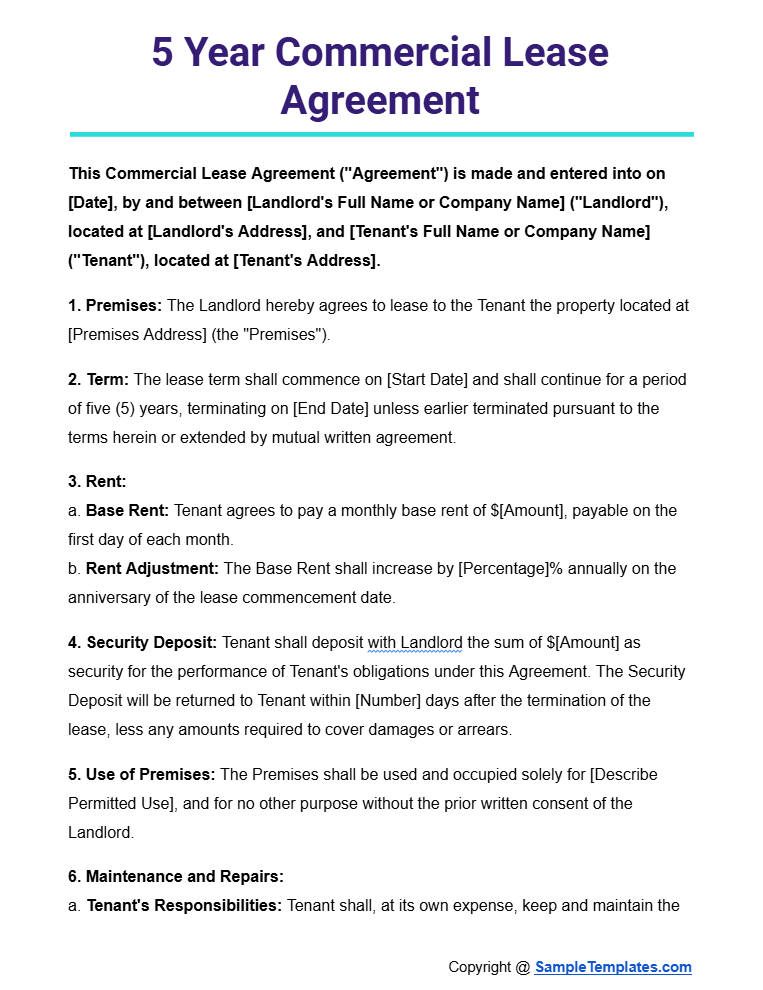
Shop Rental Agreement for Medical
This Shop Rental Agreement (“Agreement”) is made and entered into on [Date], by and between [Landlord’s Full Name or Company Name] (“Landlord”), located at [Landlord’s Address], and [Tenant’s Full Name or Company Name] (“Tenant”), who will operate a medical practice, located at [Tenant’s Address].
1. Premises: The Landlord hereby agrees to lease to the Tenant the property located at [Premises Address] (the “Premises”), which shall be used exclusively for medical purposes.
2. Term: The lease term shall commence on [Start Date] and shall terminate on [End Date], unless earlier terminated pursuant to the terms herein or extended by mutual agreement.
3. Rent:
a. Base Rent: Tenant agrees to pay a monthly base rent of $[Amount], payable on the first day of each month.
b. Late Payment: A late fee of $[Late Fee Amount] will be charged if the rent is paid after the [Day of Month] of the month.
4. Security Deposit: Tenant shall provide a security deposit of $[Amount] upon execution of this Agreement, to cover any damages or unpaid rent. The deposit will be returned within [Number] days of lease termination, minus any deductions for repairs or unpaid dues.
5. Use of Premises: The Premises are to be used solely for the operation of a medical practice or healthcare-related business. Any other use requires prior written consent from the Landlord.
6. Compliance: Tenant agrees to comply with all local, state, and federal regulations regarding the operation of a medical facility, including but not limited to health, safety, and accessibility standards.
7. Maintenance and Repairs:
a. Tenant’s Responsibilities: Tenant is responsible for the interior maintenance and repair of the Premises, including medical equipment, plumbing in relation to medical use, and electrical fixtures.
b. Landlord’s Responsibilities: Landlord shall maintain the structural integrity of the building, roof, and exterior walls.
8. Alterations: Tenant may not make structural alterations to the Premises without the prior written approval of the Landlord. Non-structural alterations are permitted but must be removed or restored at the end of the lease term.
9. Insurance: Tenant shall maintain adequate medical malpractice insurance, general liability insurance, and property insurance to cover the contents of the Premises.
10. Termination: Either party may terminate this Agreement upon [Number] days written notice to the other party. Special termination conditions related to regulatory changes affecting medical practices will be specified herein.
11. Renewal: This Agreement may be renewed under the same or revised terms, subject to mutual agreement.
12. Governing Law: This Agreement shall be governed by and construed in accordance with the laws of the State of [State].
Signatures:
[Landlord’s Name/Signature]
Landlord
[Tenant’s Name/Signature]
Tenant
Date: [Date of Signing]
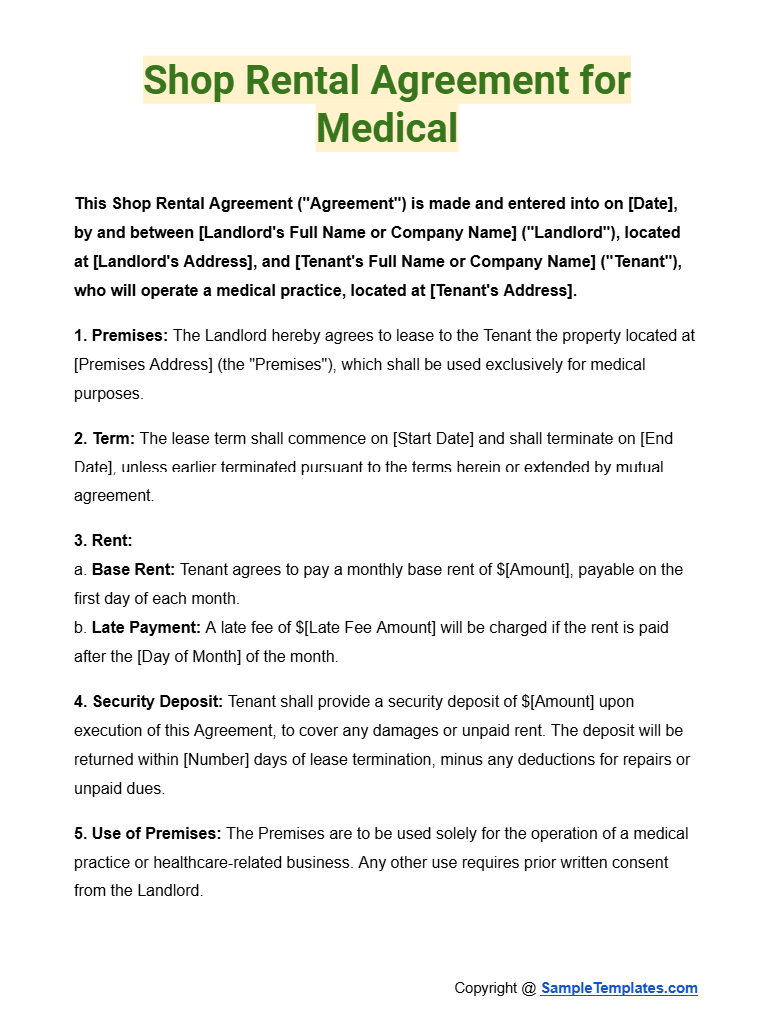
Browse More Templates On Shop Rental Agreement
1. Shop Rental Agreement Format
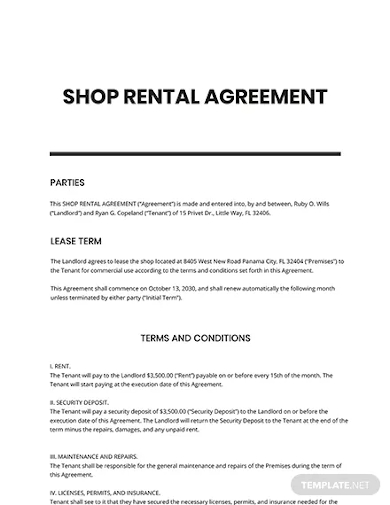
2. Shop Equipment Lease Rental Agreement
How to Make a Contract of Lease?
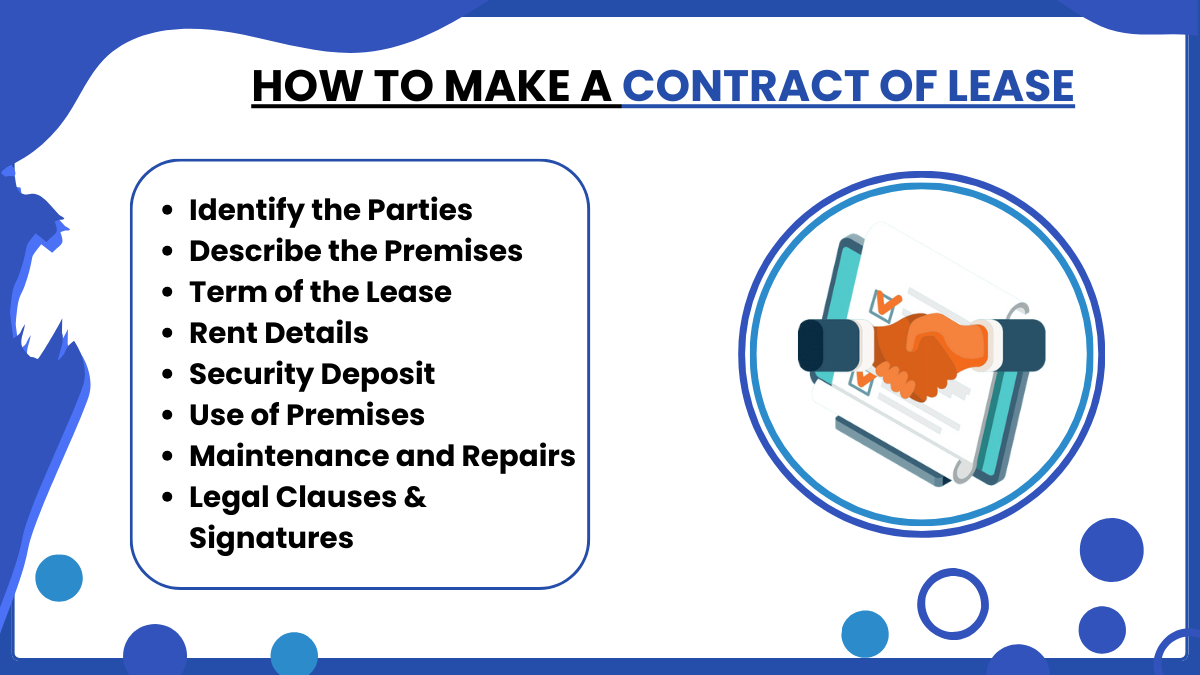
- Identify the Parties: Clearly identify both the landlord (lessor) and the tenant (lessee) with full names and addresses. If a business entity is involved, include its legal business name and the representative authorized to sign the contract.
- Describe the Premises: Provide a detailed description of the leased property. This should include the physical address, type of property (e.g., commercial, residential, industrial), and specific details like the floor area, number of rooms, and any included furnishings or appliances.
- Term of the Lease: Specify the start date and end date of the lease term. Include details on whether the lease is renewable and under what conditions.
- Rent Details: Outline the amount of rent, when it is due (e.g., monthly on the first day), forms of acceptable payment, and details about late fees or penalties for missed payments. Also, include how and when the rent may be adjusted.
- Security Deposit: State the amount of the security deposit required, the conditions under which it will be held, and how and when it will be returned at the end of the lease. Include any specific conditions that might lead to deductions from the deposit.
- Use of Premises: Clearly define the permitted uses of the property to prevent misuse and ensure the property is used appropriately according to zoning laws. If it’s commercial property, specify the type of business allowed.
- Maintenance, Repairs, and Alterations: Detail the responsibilities of both the landlord and tenant regarding maintenance and repairs. Specify which alterations the tenant is permitted to make to the property and the process for approval and restoration.
- Legal Clauses and Signatures: Include clauses covering termination conditions, subletting policies, and other legal protections such as indemnity clauses. Both parties should sign and date the contract, possibly in the presence of witnesses or a notary, to finalize the agreement.
3. Monthly Shop Rental Agreement Template
4. Shop Outdoor Equipment Rental Agreement Template
What is a Shop Rental Agreement?
A shop rental agreement is a document that serves as a sample contract between you and your client or tenant. Defining the terms of the tenancy and the the rules and regulations for the whole duration of the rent. Writing a rental agreement can have its own creative freedom because you can just basically decide what goes into the agreement since ultimately this is about your property.
A lot of rental agreements are short term, usually for around 30 days. While a similar kind of rental agreement, also commonly known as a lease agreement, are used usually for longer rental periods, like a couple months, a year, or even more than that. A rental agreement is a good tool if you want to make sure that your client who’ll eventually use your property is reliable enough to not cause any trouble or damage the property itself. Rental agreements also has its own benefits compared to a lease agreement. Which is rental agreements are typically easier to terminate per contract, rather than a whole lease.
5. Violin Shop Rental Agreement Template
6. Gear Shop Rental Agreement Template
7. Shop Rental Liability Release Agreement Template
8. Shop Rental Accident Insurance Agreement Template
How to Write a Shop Rental Agreement?
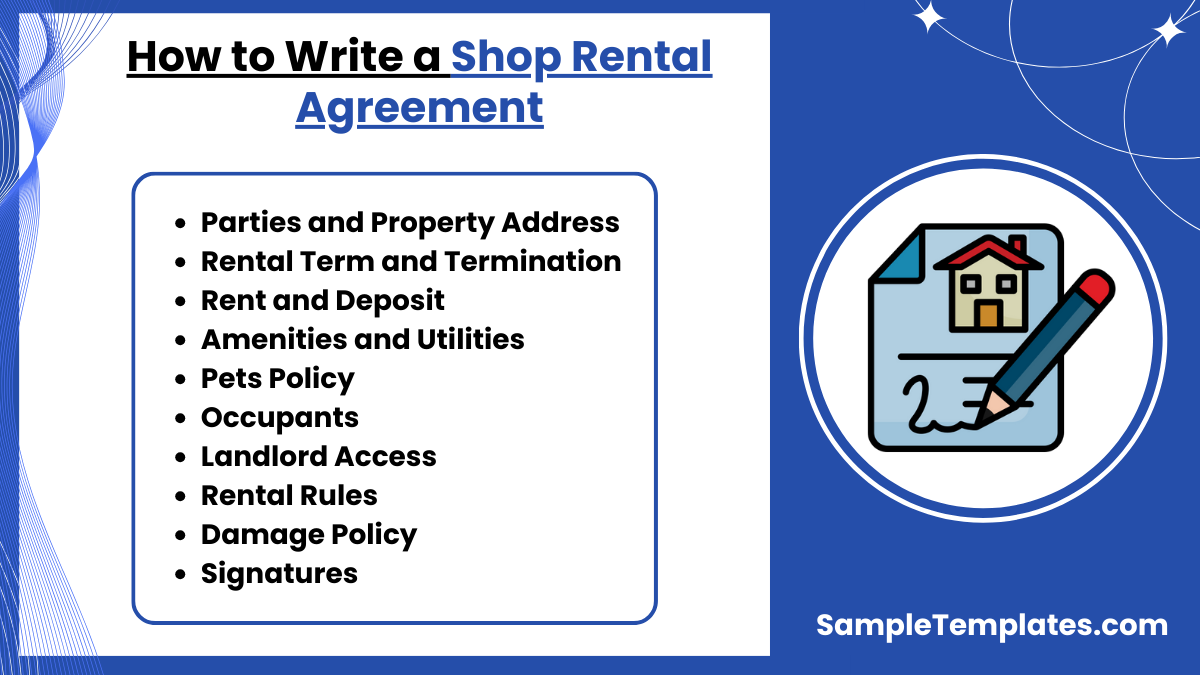
A rental agreement should include specific provisions so that the document does its purpose of protecting you. It’s usual for property owners to have an attorney prepare the agreement for you. More specific provisions can be included, depending on the scale of your property or the type of rental. Regardless, the document should include at least the following 10 items.
1. Identify the parties to the agreement and the address of your property
Make sure that you list down the name of the client that will be using your property and provide them your details as well. Include both of your names, the address of the property, and a rough description if you are unable to provide the complete specific address. Be precise.
2. The term of the rental and how it ends
List how long the rental agreement term is and make sure they understand it. Start the rental term on the first of the month. Include how much notice you and your client must provide is either of you wants to end the rental agreement.
3. Rent and security deposit
State how much the monthly rent is, where the tenant should pay, and how the payment process is going to be. State whether you accept cash, card, or cashless payment. If you want your client to send a check every month, include the mailing address. Include the interest in payment if there are any late fees, but make sure that they are not excessive.
4. What’s include with the rental
State whether the property provides any extra utilities or amenities. Electric, heat, gas, cable, etc. If not, state the client’s responsibility for the utilities. Give a clear description of what’s included in the rent and what isn’t. What utilities are present in your property and the ones that your client still needs to provide for themselves. State if you’re providing appliances and furniture, sample list them by their names.
5. Pets
State if pets are allowed on the property or not. You can also choose to have a no-pet policy, be sure to state that in your agreement.
6. Each occupant’s name and the number of occupants
If you don’t want additional occupants more than the original client, state that the tenant is the only person allowed to occupy the property. List all occupants that are allowed and the maximum number of people that can the property can accommodate.
7. Landlord’s access to the property for repairs, maintenance, and repairs
Be clear about the sample notices you’ll give to enter the premises for repairs and maintenance other than for emergency. Some local communities have their own requirements for notices, while some of the states have consistent requirements all throughout the state.
8. Rules of the rental
List the things that you expect from the tenant such as no illegal activities, no smoking on site, and must be closed at a particular time of the day or night. State that you’ll terminate the agreement of the client fails to follow the rules that you have listed, and that the client is responsible for the legal fees if the issue reaches court.
9. Damaged property
State that the client is responsible for damages other than the property just breaking down. Include that the client must return the property in the condition that it was originally in.
10. Signatures
You and your client should sign the document and have it signed by an attorney or a notary for legal binding.
9. Shop Landlord Rental Agreement Template
10. Commercial Tenancy Shop Rental Agreement Template
What is the Agreement Between Two Parties Shop Rent?
A Shop Rent Agreement, also known as a Commercial Lease Agreement, is a legally binding contract between a landlord (property owner) and a tenant (business owner) for the rental of a retail space. This agreement outlines the terms and conditions under which the tenant can use the premises for commercial purposes. Here is a detailed explanation of the key components typically found in such an agreement:
- Parties Involved:
- Clearly state the names and addresses of both the landlord and the tenant.
- Property Description:
- Provide a detailed description of the rented space, including the address, floor or unit number, and any specific features or restrictions.
- Lease Term:
- Specify the duration of the lease, including the start and end dates. Sample Outline any provisions for renewal or termination.
- Rent Details:
- Clearly state the amount of rent due, the frequency of payments (monthly, quarterly, etc.), and the acceptable methods of payment. Outline any penalties for late payments.
- Security Deposit:
- Define the amount of the security deposit and the conditions under which it will be returned to the tenant at the end of the lease term.
- Maintenance and Repairs:
- Clearly outline the responsibilities of both parties regarding maintenance and repairs. Specify which party is responsible for specific types of repairs and maintenance.
- Use of Premises:
- Clearly define the permitted uses of the rented space. Include any restrictions on the types of businesses or activities allowed.
- Utilities and Services:
- Specify which party is responsible for paying utilities, and outline any additional services provided by the landlord (cleaning, security, etc.).
- Insurance:
- Outline the insurance requirements for both the landlord and the tenant. This may include liability insurance and coverage for the property.
- Termination Clause:
- Clearly state the conditions under which either party can terminate the lease before the end of the agreed-upon term.
- Alterations and Improvements:
- Specify whether the tenant is allowed to make alterations or improvements to the premises and under what conditions.
- Compliance with Laws:
- Ensure that the tenant agrees to comply with all applicable laws, regulations, and zoning requirements during the lease term.
- Dispute Resolution:
- Include a clause outlining the process for resolving disputes between the landlord and the tenant, such as through mediation or arbitration.
- Notices:
- Outline the procedures for giving and receiving official notice sample between the parties.
- Governing Law:
- Specify the jurisdiction and governing law that will apply in case of any legal disputes.
- Signatures:
- Conclude the agreement with spaces for both parties to sign and date the document, indicating their acceptance of the terms.
FAQs
Who keeps the original rental agreement?
Typically, the original rental agreement is kept by the landlord or property management company analysis. However, it’s advisable for both parties to retain a copy for their records.
Who pays the rent agreement?
The landlord usually keeps the original copy of the rental agreement. Generally, the tenant bears the costs associated with the whole rental agreement process.
Is it mandatory to provide rental agreement?
While not mandatory in all jurisdictions, providing a rental agreement is a common practice to establish terms and protect both the landlord and tenant’s rights and responsibilities.
What happens if there is no rental agreement?
If there is no rental agreement, conflicts may arise over terms and responsibilities. It’s advisable to have a written agreement to clarify expectations and protect the interests of both the landlord and tenant.
Is rent agreement required for GST registration?
Rent agreements are not directly required for GST registration. However, landlords may need to provide address proof, which can include a rent agreement, as part of the registration process.
Having your property rented has its own fair share of risks, most more compelling than others. But as long as you have these elements in your rental agreement sample, and that your document is well drafted overall, you’ll be protecting yourself from a world of trouble. The rental agreement format provides a relatively easy way for you to impose your authority as the landlord and show them that they should be responsible for all of their activities during the duration of the stay.
In conclusion, a well-drafted shop rental agreement is crucial for establishing clear terms between parties. It serves as a legal safeguard, promoting a smooth landlord-tenant relationship and protecting both parties’ interests.
Related Posts
FREE 10+ Trial Agreement Samples In MS Word | Google Docs | Apple Pages | PDF
FREE 10+ Charter Agreement Samples In MS Word | Google Docs | Apple Pages | PDF
FREE 10+ Mentoring Agreement Samples In MS Word | Apple Pages | PDF
FREE 10+ Partner Agreement Samples In MS Word | Google Docs | Apple Pages | PDF
FREE 10+ Individual Agreement Samples In MS Word | Google Docs | Apple Pages | PDF
FREE 10+ Strategic Agreement Samples In MS Word | Google Docs | Apple Pages | PDF
FREE 10+ Equity Agreement Samples In MS Word | Google Docs | Apple Pages | PDF
FREE 10+ Producer Agreement Samples in MS Word | Apple Pages | PDF
FREE 10+ Grant Agreement Samples In MS Word | Apple Pages | PDF
FREE 8+ Meeting Agreement Samples in MS Word | Google Docs | Apple Pages | PDF
FREE 10+ Community Agreement Samples In MS Word | Google Docs | PDF
FREE 8+ Real Estate Option Agreement Samples in MS Word | PDF
FREE 10+ Call Option Agreement Samples In MS Word | PDF
FREE 10+ Advertising Agreement Samples In MS Word | Google Docs | Apple Pages | PDF
FREE 10+ Car Agreement Samples In MS Word | Google Docs | Apple Pages | PDF
